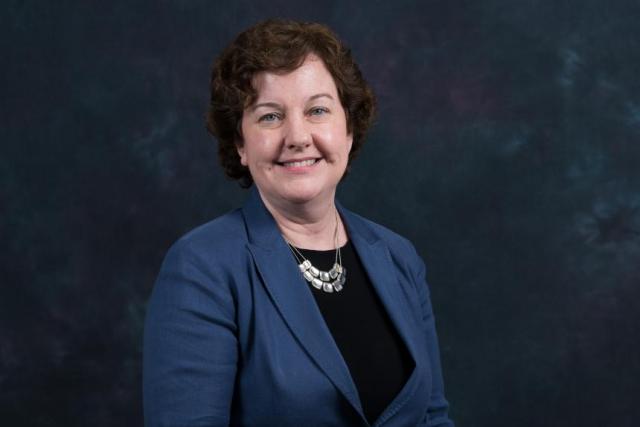Q&A: Creating a More Diverse Future for Computer Science

Computer scientists “help create the future,” according to Patricia Morreale, Ph.D., professor and executive director of the Kean University School of Computer Science. A fellow of the prestigious American Association for the Advancement of Science (AAAS), she has won praise for her leadership in helping make the future of computer science more diverse. As Kean recognizes Women’s History Month, Kean News asked her about diversity in computing.
Q. You've been cited by the AAAS for "exceptional leadership and service to advance diversity in computing," among other accomplishments. What is the status of women and minorities in computing?
Women earned about half of bachelor’s degrees in the sciences and engineering in 2016, and more than 40 percent of advanced degrees, according to the National Science Federation - about the same as 10 years earlier. But statistics vary among disciplines. Only 19 percent of bachelor’s degrees in computer science went to women, down from 27 percent in 1997. Computer science and information technology enrollments have grown nationally, but this has not always corresponded to an increase in overall enrollment percentages of women and minorities.
Q. What percentage of computer science majors at Kean come from traditionally underrepresented groups?
Kean has always welcomed women and minorities to our computer science and information technology programs. Our program is over 50 percent minority enrollment and almost 20 percent female enrollment. We are fortunate that as our overall CS and IT program enrollment has grown, our minority and female enrollments have grown at a faster rate.
Q. What are some of the efforts you have undertaken that have increased the number of women computer science majors and those from underrepresented ethnicities?
We approach that challenge in a number of ways. At Kean, my colleague Dr. Jenny Li received seed funding to start a chapter of the ACM-W (Association for Computing Machinery), our computing professional society, for women in 2016. The ACM-W chapter has grown and hosted a hack day on December 1, 2018. In 2018, Kean become one of a select group of universities to receive a Women in Cybersecurity (WiCyS) chapter. The Kean WiCyS has hosted several meetings and several student leaders will attend the Women in Cybersecurity Conference in Pittsburgh this month. Kean is also a member of the Computing Alliance for Hispanic Serving Institutions.
HackKean, being held for the fifth year on April 6-7, is a terrific event we host with Kean's Student Organization. Students come each year from Kean, surrounding schools or high schools, and enjoy 24 hours of coding and creation. We also encourage all CS and IT major students to join a game we've developed called Cougar Pathway to Success, which identifies small steps students can take to move toward their goal of graduation. And, students interested in research can work with Kean faculty, then apply for NSF Research Experiences for Undergraduates to further develop their expertise.
Finally, we developed partnerships, most recently with Palo Alto Networks Cybersecurity Academy, and CompTIA, offering students additional exposure to professional tools. Our faculty includes many talented men and women, who provide a variety of role models for our students, which students appreciate as well.
We promote the accessibility of the field and share opportunities for participation in local, regional and national events, such as the Grace Hopper Conference and the Great Minds in STEM conference. Students receive scholarships to attend and often, that is where they take off — seeing the opportunities and activities available to them.
Q. Why is diversity in computing important?
Diversity in computing is important so we are able to design and use computers in many different places, under many conditions, and for many different people. For example, without diversity in computing, facial recognition software might not recognize a range of skin tones. Or, voice-recognition software might not respond appropriately.
Q. Do you have a goal for Kean in the future?
I'd like every student coming to Kean to consider CS and IT as a major or minor. This is actually a fairly realistic goal. Since fall 2018, New Jersey has required all high schools to offer computer science courses. In the future, I anticipate all Kean students will arrive with computer science and information technology skills, along with math, English, science, and other skills.
Q. What are you proudest of at the Kean University School of Computer Science?
Kean's School of Computer Science is young -- established in 2018. Until 2008, the program had been part of mathematical sciences. The last decade has seen rapid change in our field, and during that time, the School of Computer Science has excelled. We've developed new program options in cybersecurity and data science, and updated all our curriculum. We offer minors in health information technology, computer science education and cybersecurity, plus computer science and information technology. Our graduate program continues to grow as well. Our students are very actively engaged with faculty, which is a real distinction. We are proud of the success of all our students, and work hard to make sure our program achieves distinction.
Q. Why did you choose to enter the field of computer science?
I enjoyed the applied aspects of computer science and particularly liked the variety. As an undergraduate, I wanted a portable, adaptable career, and computer science offered that. With applications in many areas and fields, I knew I was not going to be 'stuck' doing the same thing over and over. After college, I took an industry job, and enjoyed the wide range of problems we solved, and seeing how those solutions impacted people. I still enjoy that very much.
Q. As a woman at the highest level in the field of computing, what is the field like for women?
For anyone, there is no limit in computing. If you'd like to help create the future, I encourage future computer scientists to get off the sidelines and get involved — we really need you! You'll make a difference in ways you can't even imagine.